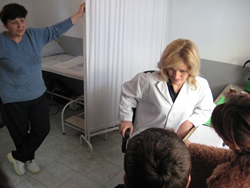We travelled across Kosovo just a few months after the unilateral declaration of independence on 17 February 2008 by Prime Minister Hashim Thaçi, supported by the Albanian faction of Parliament. After initial insurgent reactions from within Serbian parts of the country, it was now relatively quiet.
Kosovo has around 2 million inhabitants. Over 90% are of Albanian descent, Serbs make up 6% of the population, and then there are also Macedonians and Romas.
The country boasts magnificent nature, high mountains (up to 2,500 metres) in the south and west and several beautiful lakes. During our trip we were also able to spot people bathing in the hot geyser basins. From a touristic viewpoint this is a country with potential, but it has major problems.
Just like the other Balkan countries, Kosovo has a rich, but often also sad, past with a considerable history of war. The last brutal conflicts with Milosevic’s Serbia have left their marks. In many cities and villages we were confronted with houses, mosques and other buildings which had been destroyed.
The economy is one of the most underdeveloped in Europe and according to the world bank the GNP is below € 1,565 per capita. A considerable part of the economy is made up of illegal activities, such as smuggling cigarettes, petrol and automobiles, but there is also human trafficking. Kosovo is a transit country for girls and women on their way to sexual exploitation or forced labour in Europe.
 Unwanted children
Unwanted children
Some NGOs are focusing on improving things for all the children in this country.
Many children have been born who are unwanted. Many women and girls, some still very young, have had sexual contacts with the foreign soldiers stationed in Kosovo or with members of other international organisations. The women were not well educated and also had no contraception at their disposal. Unwanted pregnancies have often been the result.
Over the last few years hundreds of new-born babies have been left abandoned, and also dead babies have been found. The main reason for this is that the biological fathers are absent, having left the young mothers and the country by the time of the babies’ birth, and the young mothers are not welcome anymore in the Muslim culture. In addition there’s often no money to offer the children a decent upbringing.
UNMIK, responsible for proper governance in Kosovo on behalf of the UN, is taking measures address these problems, for example by putting a victim’s helpline in place, but women hesitate to consult this official organisation.
Projects
However, there are promising initiatives which have been taken by the Kosovar population. We got acquainted with an experienced nurse from the capital, Pristina, who worked for years in Switzerland as a midwife and now has little helpdesks (medical stations) in several villages to educate and counsel the young women on medical matters. She is receiving assistance from a female gynaecologist and, thanks to some help from abroad, she now has a modest amount of medical utensils. To prevent public ridicule and to protect their privacy, the small medical examination rooms are somewhat secluded and away from the usual Kosovo bustling public street life. This project is a successful initiative that deserves to be duplicated on a larger scale!
We visited a youth care organisation working in a Serbian enclave. Although the material aspect seemed to be relatively well in order, we were extremely worried about the approach towards the children many of whom were disabled.
Damage caused by the rift between the two main communities
Unfortunately this organisation was completely isolated because, as yet, there are no discussions between the separate services for the Serbian and Albanian communities.
First, therefore, the organisation of youth care in the country needs to be sorted out.
We are trying to set up a youth care network in Kosovo and to connect organisations to the international FICE network. Although FICE already has an extensive network in southeast Europe, the political situation will hamper making links because of the division within Kosovo itself.
Recognition of Kosovo by the Dutch Government along with other countries may open the way for the allocation of funds for more projects in this very poor country.
There is certainly a lot of work to be done.
Anton Tobe is Vice President of FICE-International with especial responsibility for maintaining links in south-east Europe.
